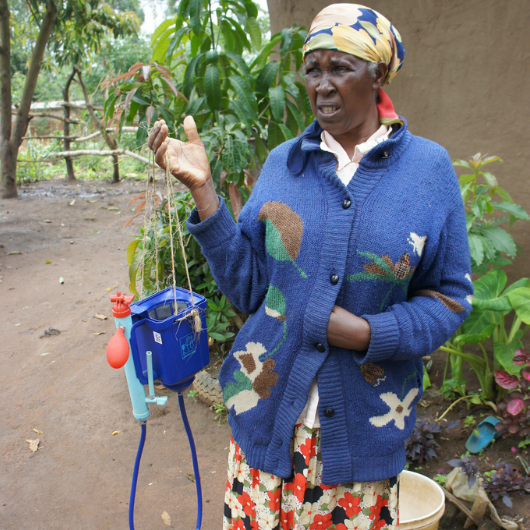LifeStraw Purifiers: Kenyan Schoolchildren with Drinking Water
 In Eastern Africa, 70 percent of hospital visits are related to contaminated water. This is due to a lack of clean water sources. The majority of people in developing countries depend on water sources like rivers to drink and bathe, but serious illnesses like typhoid fever, dysentery and guinea worm disease are common diagnoses for those who consume dirty water. In fact, diarrhea is the third leading cause of death in Kenya.
In Eastern Africa, 70 percent of hospital visits are related to contaminated water. This is due to a lack of clean water sources. The majority of people in developing countries depend on water sources like rivers to drink and bathe, but serious illnesses like typhoid fever, dysentery and guinea worm disease are common diagnoses for those who consume dirty water. In fact, diarrhea is the third leading cause of death in Kenya.
Vestergaard, a Swiss global health company, created a water filtration system called LifeStraw to put an end to these water-related infections. LifeStraw is a lightweight, portable filter that uses hollow fiber technology to filter up to 1,000 liters of water. The filter is also chemical-free and does not require any electrical power — instead, it depends on the suction generated by its user.
Water enters the plastic container and flows through narrow fibers under high pressure. These fibers then trap bacteria and other toxins that are flushed out of the water via backwashing. The clean water travels through pores in the walls of these fibers.
With LifeStraw, households in these regions will no longer have to boil contaminated water to make it drinkable. As a result, there will likely be a reduction in indoor pollution and house fires. People will also burn less firewood, which helps lessen deforestation. According to Vestergaard, the use of LifeStraw reduces carbon emissions by nearly three tons per year, per filter.
Of note, luxury car manufacturer Jaguar Land Rover (JLR) invested in LifeStraw in 2013 in support of sustainability. In partnership with the carbon-offset company ClimateCare, the LifeStraw Carbon for Water project was born. This partnership has provided 1,900,000 people in western Kenya with LifeStraw filters.
Within the next few years, this investment will also provide 300,000 Kenyan schoolchildren access to safe water and filtration training programs. Once LifeStraw filters are installed at a school in Kenya, a JLR team will monitor its use once every term for five years. Teachers and students will also complete training to learn about the significance of clean water.
In 2014, the Follow the Liters campaign was created by 80 LifeStraw volunteers to provide schoolchildren with safe water. If a person purchases one LifeStraw water filter, the company will provide a child from the developing world with clean drinking water for an entire year.
Last year, 158,000 African students were provided with a LifeStraw filter and 300 more schools in western Kenya also received filters.
– Kelsey Lay
Sources: Business Fights Poverty, Jaguar Land Rover, LifeStraw, The Examiner
Photo: Flickr
